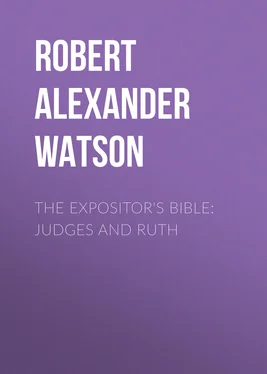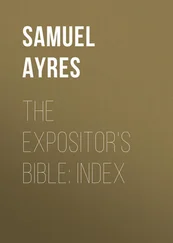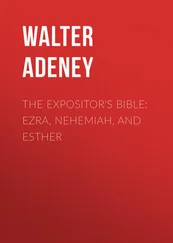Robert Alexander Watson - The Expositor's Bible - Judges and Ruth
Здесь есть возможность читать онлайн «Robert Alexander Watson - The Expositor's Bible - Judges and Ruth» — ознакомительный отрывок электронной книги совершенно бесплатно, а после прочтения отрывка купить полную версию. В некоторых случаях можно слушать аудио, скачать через торрент в формате fb2 и присутствует краткое содержание. Издательство: Иностранный паблик, Жанр: foreign_prose, foreign_religion, Философия, foreign_psychology, foreign_antique, на английском языке. Описание произведения, (предисловие) а так же отзывы посетителей доступны на портале библиотеки ЛибКат.
- Название:The Expositor's Bible: Judges and Ruth
- Автор:
- Издательство:Иностранный паблик
- Жанр:
- Год:неизвестен
- ISBN:нет данных
- Рейтинг книги:5 / 5. Голосов: 1
-
Избранное:Добавить в избранное
- Отзывы:
-
Ваша оценка:
- 100
- 1
- 2
- 3
- 4
- 5
The Expositor's Bible: Judges and Ruth: краткое содержание, описание и аннотация
Предлагаем к чтению аннотацию, описание, краткое содержание или предисловие (зависит от того, что написал сам автор книги «The Expositor's Bible: Judges and Ruth»). Если вы не нашли необходимую информацию о книге — напишите в комментариях, мы постараемся отыскать её.
The Expositor's Bible: Judges and Ruth — читать онлайн ознакомительный отрывок
Ниже представлен текст книги, разбитый по страницам. Система сохранения места последней прочитанной страницы, позволяет с удобством читать онлайн бесплатно книгу «The Expositor's Bible: Judges and Ruth», без необходимости каждый раз заново искать на чём Вы остановились. Поставьте закладку, и сможете в любой момент перейти на страницу, на которой закончили чтение.
Интервал:
Закладка:
A mark of the humanness and, shall we not also say, the divineness of this history is to be found in the frequent notices of other tribes than those of Israel. To the inspired writer it is not all the same whether Canaanites die or live, what becomes of Phœnicians or Philistines. Of this we have two examples, one the case of the Jebusites, the other of the people of Luz.
The Jebusites, after the capture of the lower city already recorded, appear to have been left in peaceful possession of their citadel and accepted as neighbours by the Benjamites. When the Book of Judges was written Jebusite families still remained, and in David's time Araunah the Jebusite was a conspicuous figure. A series of terrible events connected with the history of Benjamin is narrated towards the end of the Book. It is impossible to say whether the crime which led to these events was in any way due to bad influence exercised by the Jebusites. We may charitably doubt whether it was. There is no indication that they were a depraved people. If they had been licentious they could scarcely have retained till David's time a stronghold so central and of so much consequence in the land. They were a mountain clan, and Araunah shows himself in contact with David a reverend and kingly person.
As for Bethel or Luz, around which gathered notable associations of Jacob's life, Ephraim, in whose territory it lay, adopted a stratagem in order to master it, and smote the city. One family alone, the head of which had betrayed the place, was allowed to depart in peace, and a new Luz was founded "in the land of the Hittites." We are inclined to regard the traitor as deserving of death, and Ephraim appears to us disgraced, not honoured, by its exploit. There is a fair, straightforward way of fighting; but this tribe, one of the strongest, chooses a mean and treacherous method of gaining its end. Are we mistaken in thinking that the care with which the founding of the new city is described shows the writer's sympathy with the Luzzites? At any rate, he does not by one word justify Ephraim; and we do not feel called on to restrain our indignation.
The high ideal of life, how often it fades from our view! There are times when we realize our Divine calling, when the strain of it is felt and the soul is on fire with sacred zeal. We press on, fight on, true to the highest we know at every step. We are chivalrous, for we see the chivalry of Christ; we are tender and faithful, for we see His tenderness and faithfulness. Then we make progress; the goal can almost be touched. We love, and love bears us on. We aspire, and the world glows with light. But there comes a change. The thought of self-preservation, of selfish gain, has intruded. On pretext of serving God we are hard to man, we keep back the truth, we use compromises, we descend even to treachery and do things which in another are abominable to us. So the fervour departs, the light fades from the world, the goal recedes, becomes invisible. Most strange of all is it that side by side with cultured religion there can be proud sophistry and ignorant scorn, the very treachery of the intellect towards man. Far away in the dimness of Israel's early days we see the beginnings of a pious inhumanity, that may well make us stay to fear lest the like should be growing among ourselves. It is not what men claim, much less what they seize and hold, that does them honour. Here and there a march may be stolen on rivals by those who firmly believe they are serving God. But the rights of a man, a tribe, a church lie side by side with duties; and neglect of duty destroys the claim to what otherwise would be a right. Let there be no mistake: power and gain are not allowed in the providence of God to anyone that he may grasp them in despite of justice or charity.
One thought may link the various episodes we have considered. It is that of the end for which individuality exists. The home has its development of personality—for service. The peace and joy of religion nourish the soul—for service. Life may be conquered in various regions, and a man grow fit for ever greater victories, ever nobler service. But with the end the means and spirit of each effort are so interwoven that alike in home, and church, and society the human soul must move in uttermost faithfulness and simplicity or fail from the Divine victory that wins the prize.
III.
AT BOCHIM; THE FIRST PROPHET VOICE
From the time of Abraham on to the settlement in Canaan the Israelites had kept the faith of the one God. They had their origin as a people in a decisive revolt against polytheism. Of the great Semite forefather of the Jewish people, it has been finely said, "He bore upon his forehead the seal of the Absolute God, upon which was written, This race will rid the earth of superstition." The character and structure of the Hebrew tongue resisted idolatry. It was not an imaginative language; it had no mythological colour. We who have inherited an ancient culture of quite another kind do not think it strange to read or sing:
"Hail, smiling morn, that tip'st the hills with gold,
Whose rosy fingers ope the gates of day,
Who the gay face of nature dost unfold,
At whose bright presence darkness flies away."
These lines, however, are full of latent mythology. The "smiling morn" is Aurora, the darkness that flies away before the dawn is the Erebus of the Greeks. Nothing of this sort was possible in Hebrew literature. In it all change, all life, every natural incident are ascribed to the will and power of one Supreme Being. "Jehovah thundered in the heavens and the Highest gave His voice, hailstones and coals of fire." "By the breath of God ice is given, and the breadth of the waters is straitened." "Behold, He spreadeth His light around Him; … He covereth His hands with the lightning." "Thou makest darkness and it is night." Always in forms like these Hebrew poetry sets forth the control of nature by its invisible King. The pious word of Fénelon, "What do I see in nature? God; God everywhere; God alone," had its germ, its very substance, in the faith and language of patriarchal times.
There are some who allege that this simple faith in one God, sole Origin and Ruler of nature and life, impoverished the thought and speech of the Hebrews. It was in reality the spring and safeguard of their spiritual destiny. Their very language was a sacred inheritance and preparation. From age to age it served a Divine purpose in maintaining the idea of the unity of God; and the power of that idea never failed their prophets nor passed from the soul of the race. The whole of Israel's literature sets forth the universal sway and eternal righteousness of Him who dwells in the high and lofty place, Whose name is Holy. In canto and strophe of the great Divine Poem, the glory of the One Supreme burns with increasing clearness, till in Christ its finest radiance flashes upon the world.
While the Hebrews were in Egypt, the faith inherited from patriarchal times must have been sorely tried, and, all circumstances considered, it came forth wonderfully pure. "The Israelites saw Egypt as the Mussulman Arab sees pagan countries, entirely from the outside, perceiving only the surface and external things." They indeed carried with them into the desert the recollection of the sacred bulls or calves of which they had seen images at Hathor and Memphis. But the idol they made at Horeb was intended to represent their Deliverer, the true God, and the swift and stern repression by Moses of that symbolism and its pagan incidents appears to have been effectual. The tribes reached Canaan substantially free from idolatry, though teraphim or fetishes may have been used in secret with magical ceremonies. The religion of the people generally was far from spiritual, yet there was a real faith in Jehovah as the protector of the national life, the guardian of justice and truth. From this there was no falling away when the Reubenites and Gadites on the east of Jordan erected an altar for themselves. "The Lord God of gods," they said, "He knoweth, and Israel he shall know if it be in rebellion, or if in transgression against the Lord." The altar was called Ed , a witness between east and west that the faith of the one Living God was still to unite the tribes.
Читать дальшеИнтервал:
Закладка:
Похожие книги на «The Expositor's Bible: Judges and Ruth»
Представляем Вашему вниманию похожие книги на «The Expositor's Bible: Judges and Ruth» списком для выбора. Мы отобрали схожую по названию и смыслу литературу в надежде предоставить читателям больше вариантов отыскать новые, интересные, ещё непрочитанные произведения.
Обсуждение, отзывы о книге «The Expositor's Bible: Judges and Ruth» и просто собственные мнения читателей. Оставьте ваши комментарии, напишите, что Вы думаете о произведении, его смысле или главных героях. Укажите что конкретно понравилось, а что нет, и почему Вы так считаете.












